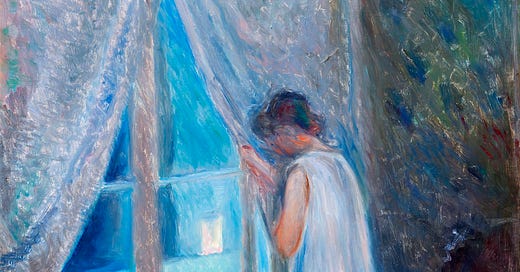Finally On My Way To Yes I Bump Into All The Places Where I Said No To My Life ~ Pesha Gertler
The art and elasticity of confession + a seven-step structured writing exercise with a special recipe for surprising and powerful endings
We all do bad things.
Some, unintentional. A simple miscalculation of the force of our own actions, like the seven-year-old throwing the football through the back window.
Some, on purpose. An act of anger or dominance, like the seven-year-old colliding full force, hands outstretched, into their younger peer on the playground, sending them careening face first into the wood chips.
We usually know the difference.
What’s often harder to know, until later, is which actions will curl into our gut and stay for the long haul.
Jenny Boully beautifully captures how pangs of guilt and grief can come back to us in her Brevity essay, I Remain Very Sorry For What I Did to the Little Black Kitten, which explores an unfortunate decision she made as a teenager in the aftermath of her mother leaving the family. The essay ends this way:
Last night, the catch of grief came hard and quick. It stung my bones. My three-year-old daughter walked up to me—we had not been talking about cats—and said that little cats like milk, they like to lick it from their little milk bowls.
I’ve felt my own catches of grief plenty of times. Over big things, yes—watching my children suffer during my divorce, being clumsy and hysterical when my son got into trouble in adolescence, the fracturing of relationships not in one big crash, but small, stinging cuts one by one by one over time, until nothing but scar tissue remains.
But I’ve also felt catches of grief over irrationally small things, like a pecan pie sliding from oven rack to floor, a child’s cry, or a puzzle piece lost.
This week as we reflect on Boully’s gorgeous essay, we have an opportunity to do our own backwards review through the lens of a confession, but with a great deal of elasticity with regard to what the word confession really means.
Certainly Boully’s essay is, in addition to a confession, an apology—but not all confessions are or must be apologies. A confession might be, for example, an admission of a secret pleasure, or a strange obsession, or even a hitherto unacknowledged love.
All of these are fascinating angles.
Consider Brenda Miller's flash essay, "Swerve," in which the narrator appears at first to be apologizing to her former partner for hitting a piece of wood in the road—but by the end of the piece, we realize she is actually apologizing to herself for something far more profound.
With all this complexity in mind, we come to realize how many different kinds of "confessions" are possible, whether related to harm done to another (which is generally also a form of harm to self), as with Boully’s piece, or harm directly to self, as with Miller’s piece, or something else altogether, including positive or playful confessions.
We might even explore one or more of those moments when we acknowledge to ourselves that we what we once said, thought, or felt about a certain situation or situations was not exactly true, if we are to be wholly forthcoming, which we might now choose to be.
The Art of the Confession: A Structured Writing Exercise
Before we begin, remember, even a confession as apology need not about be the worst thing you've ever done, or even a serious transgression. Yes, we do tend to appreciate a narrator who lets us see a glimpse of their flawed humanity, and doing so ourselves—being that narrator—sometimes gives us a portal through which to embrace our full humanity, as well.
That’s a concept that Billie and I explore together—riff on, you might say—a bit more fully in this week’s Voice Memo for founding members, which you can find here (and if you are not a founding member but would like to be one for access to Voice & Video content and Live Salons, you can manage your subscription here).
Billie (who has RYT 200-hour certification) also recorded a very beautiful short, guided meditation with the loveliest musical accompaniment for you to use prior to writing as a way to cast a warm glow around the process of confession as a portal to self-knowledge, self-love, and wholeness. It’s very lovely, and you can also just use it to bask in a warm glow, just because.
But as far as the writing goes, what we are ultimately trying to unpack here is how a confession is never just one thing—it can be a lot of interesting things that provide fertile soil for our CNF writing, obviously. But it can also be an interesting tool for building fictional characters or simply deepening our understanding of a narrator’s voice.
It’s all so rich.
So, with that in mind, here are the structured steps for this week’s writing exercise, including a special recipe for powerful endings (Thursday synchronous WITD cohort, please try to wait until after class!).
As always, we hope you’ll share your thoughts, questions, and snippets of your work in the comments!







